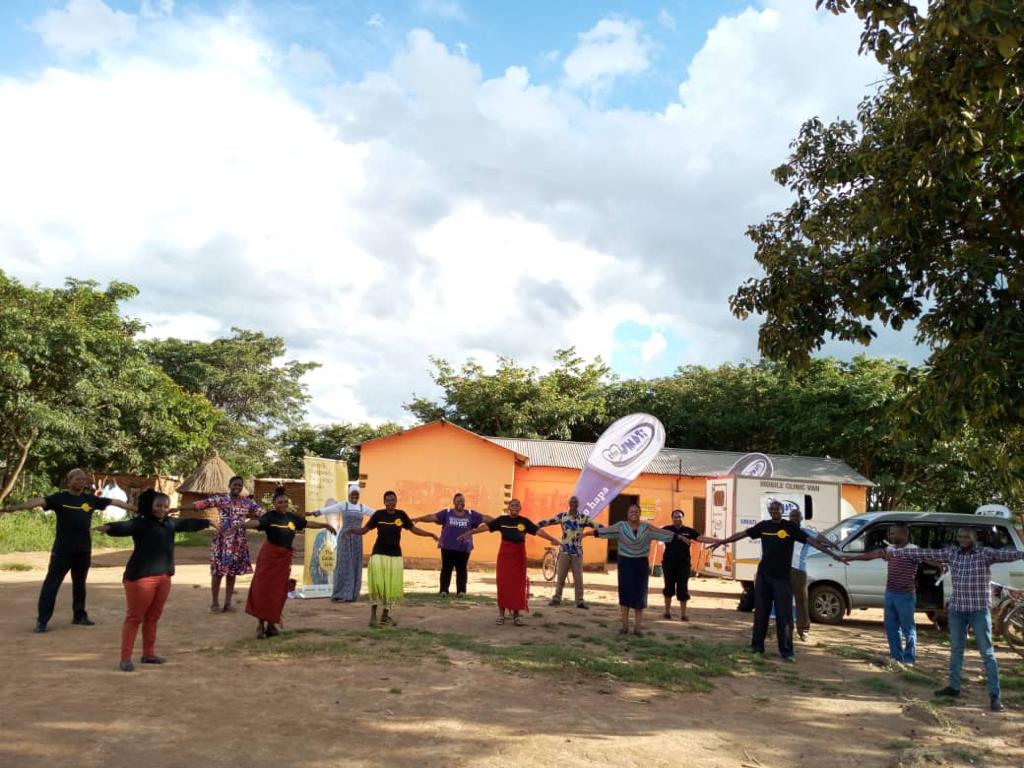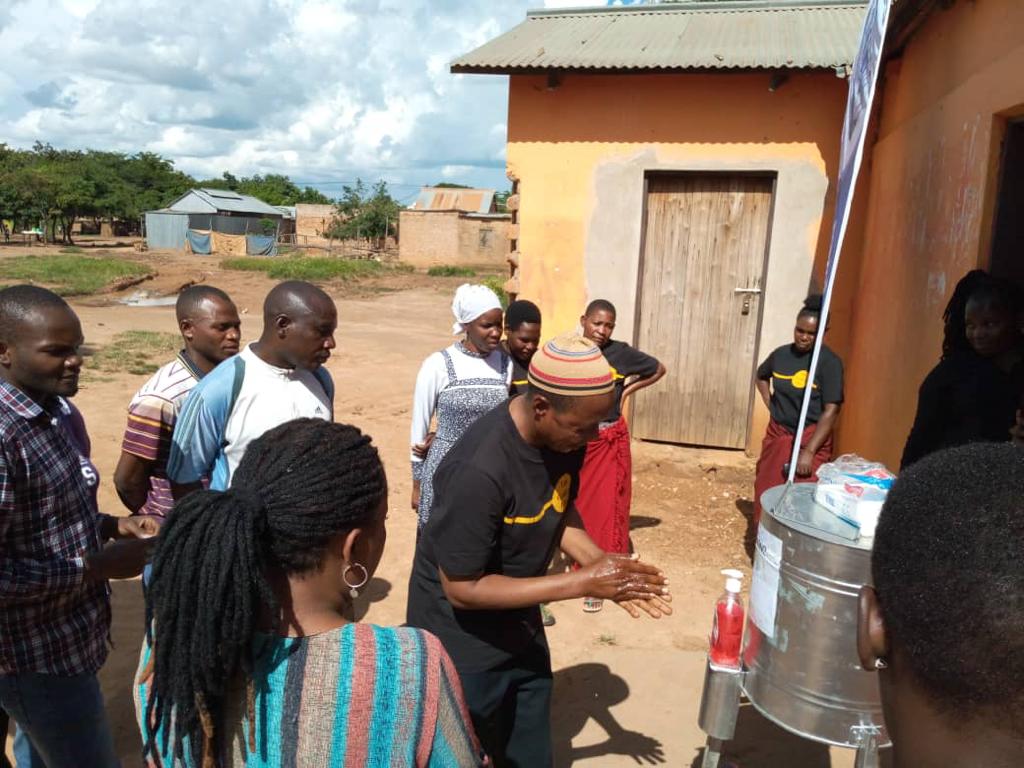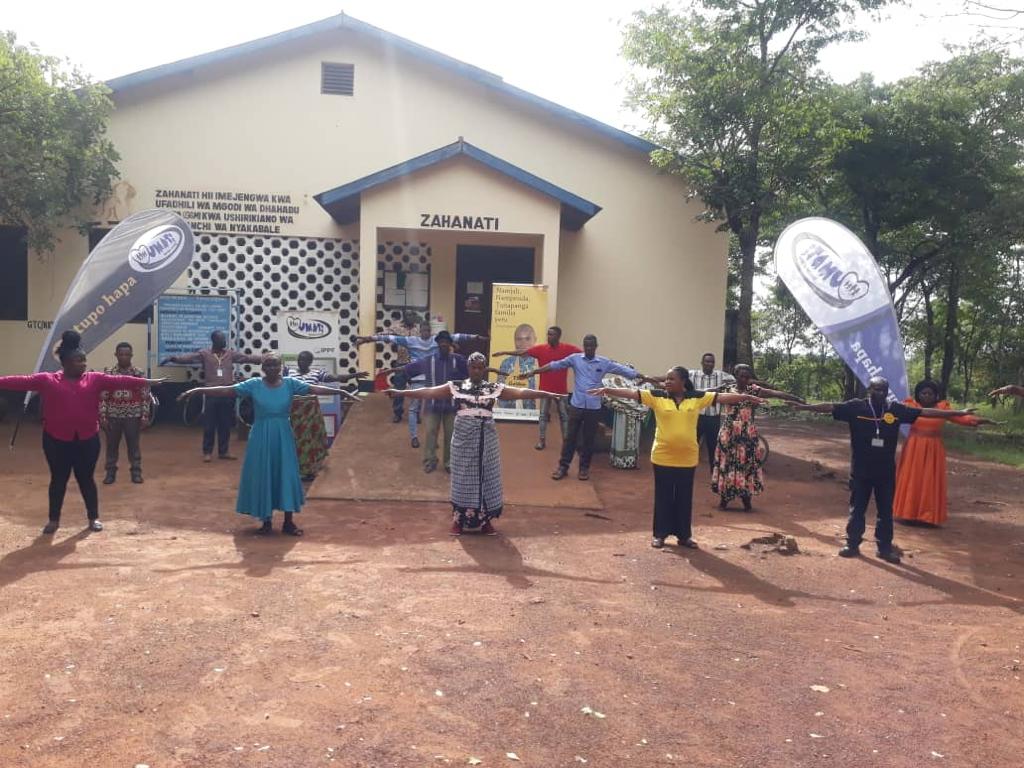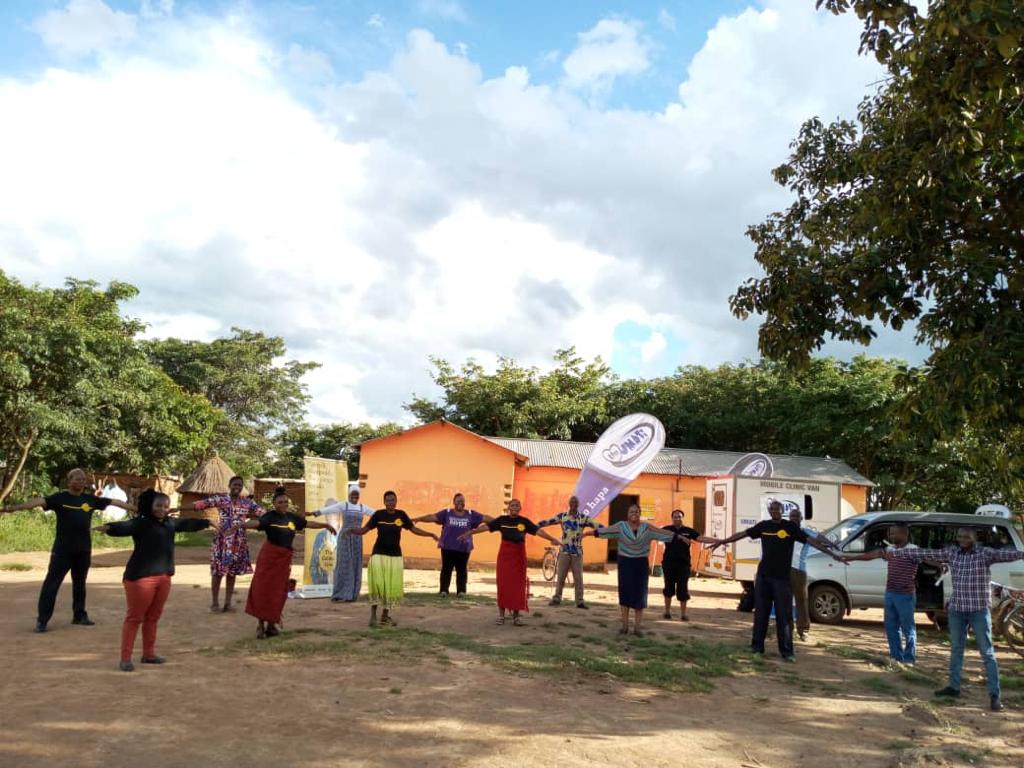
COVID-19 prevention training in a Golden Line community in Tanzania
Prevention training in communities in Tanzania
Between 4 and 8 April, Golden Line communities in Tanzania have received training on the prevention of COVID-19. Around 70 people in total have participated, including community health workers, women ambassadors, women’s group facilitators, male change agents, and mine managers.

Hand washing demonstration in the COVID-19 prevention training in a Golden Line community in Tanzania
This training was jointly organized by the Golden Line partners and facilitated by a staff member of the Geita Regional Medical Office and Golden Line partner UMATI. It has been developed based on the official guidelines of the Tanzanian government and addressed the following: recognition of symptoms, preventive measures, the myths surrounding COVID-19, a hand washing demonstration, role play, and the telephone helpline from the government. The participants have also made a plan for how they can safely share the information further in their communities, and received a form they can use to keep track of the number of people they have reached with this information.

Among others, the prevention training in Tanzania addressed the safe distance keeping in the fight against the spread of COVID-19
Outreach activities in communities in Ghana
Our Golden Line programme partners are also organizing prevention activities in communities in Western Ghana. Under the Golden Line programme, the partners have been successful in building up good relationships and trust in the community and with its leaders.The Ghana Health Service (GHS) and the National Centre for Civic Education (NCCE) have held an Emergency Response Team meeting, with the participation of Rose Baalaboore. Rose is a staff member of Simavi’s partner HFFG, which, together with PRS&D, focuses on the social and economic empowerment of women in the mining communities under the Golden Line programme. As a member of the Emergency Response Team, Rose is leading these outreach activities, jointly implemented with PRS&D (also a partner of Simavi) and Solidaridad.
‘On-the-road’ outreach activities about COVID-19 in a community in Western Ghana. Rose Baalaboore, leading these activities on behalf of Simavi’s partner HFFG, is to the centre right
The Golden Line partners have received training from the Ghana Health Service on the provision of correct information regarding the pandemic. Jointly, they conduct outreach and sensitization activities about COVID-19, providing community members with reliable, correct and up-to-date information using a mobile van and loud speaker, made available by GHS and NCCE.
Rose Baalaboore providing information on COVID-19 in the community
The outreach activities have included: early morning information provided from the van, reaching out to remote communities (around the mines); recorded jingles and voice messaging on COVID-19, along with flyers and posters which are made available to the Community Information Centres. In addition, outreach and discussion meetings take place at these Centres. The mobile van also makes it possible to invite women to ask, listen and learn from them (at the safe distance of 1,5 metres) about their needs and how the Golden Line can help to address them.
Due to the social distancing measures (also according to the regulation provided by the Ghanaian government), only 2-3 people at a time can be in the van. The Golden Line partners and representatives from the Ghana Health Service and the National Centre for Civic Education take turns doing this job.
An outreach and discussion at the local Community Information Centre
COVID-19 and impact on women in communities in Ghana
If the cases of infection of COVID-19 continue to increase, then the socio-economic position of the women in the Golden Line communities is likely to be further affected negatively. Women who run small trading businesses, for instance, are not able to move freely to other communities because of the risk of infection, which has an impact on their income. COVID-19 prevention measures also have an effect on young and pregnant women, with their access to sexual and reproductive health (SRH) facilities and services now regulated more strictly due to risk of coronavirus infection.
As the children are now home from school, they are also being taken care of by the women, and hopefully also the men. Rose shared with us:
“In the Golden Line programme, we organize Gender Discussion Sessions to promote women and men sharing household tasks and decision making.’’
Rose has also indicated that the chiefs, elders and community members were very happy with these information sharing and outreach activities, and have expressed gratitude for the support from the Golden Line programme.
“The community members, especially women, said that the information given through sensitizations has reduced their fears, taught them proper hand washing, and improved on their cleanliness at the community level.”
We have reached out to Rose to ask her a few questions on the outreach activities and the impact of COVID-19 on the communities, especially on women. Read the full interview.
The Golden Line programme is a five-year joint programme aimed at economically empowering women in artisanal and small-scale (ASM) gold mines and communities in Ghana and Tanzania, implemented with the financial support from the Dutch Ministry of Foreign Affairs.
Read more about the increased risk to the health of mine workers and communities and the importance of preventing the spread of COVID-19 in mining communities.
In the face of the continuing COVID-19 crisis, Solidaridad has called on international companies worldwide to support those in their supply chains hit hardest by the pandemic.

